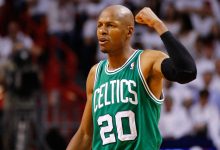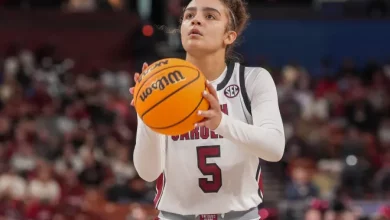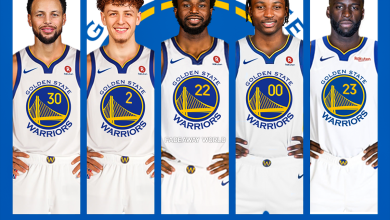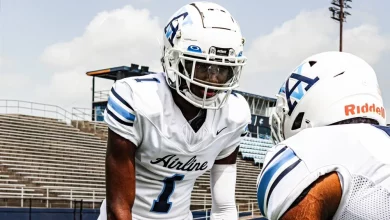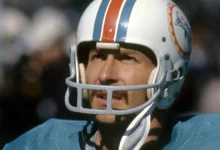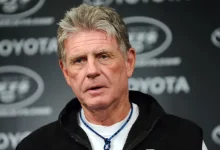Dennis Rodman averaged 14.3 REB in his last season in the NBA, playing for the Dallas Mavericks in 2000.
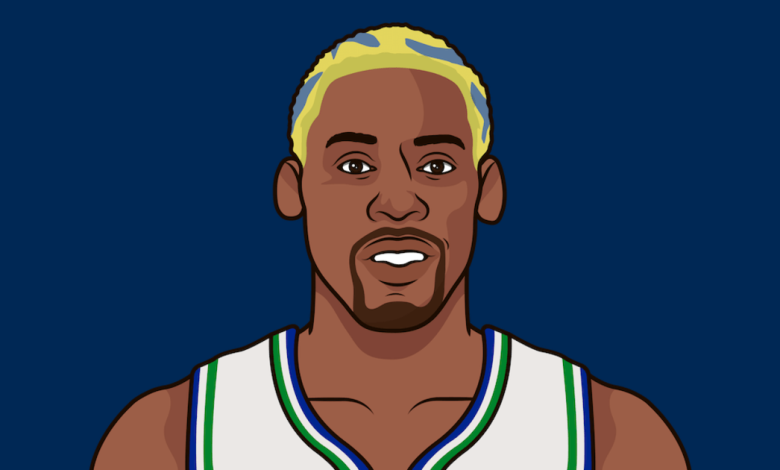
Dennis Rodman’s time with the Dallas Mavericks in the 2000 season is often overlooked when discussing his illustrious career. However, his brief stint in Dallas provided some of the most intriguing moments of his final NBA season. Known for his unparalleled rebounding ability, eccentric personality, and magnetic presence on the court, Rodman’s time in Dallas may have been short-lived, but it was a testament to his enduring talent and work ethic, even at the tail end of his career.
Rodman’s 14.3 rebounds per game during the 2000 season, the final year of his NBA career, is a staggering stat—one that speaks to his unmatched tenacity and unique understanding of the game. Despite being 39 years old and having already achieved an iconic career, Rodman continued to dominate the boards in ways that most players half his age would struggle to match. His ability to get to the ball, outwork opponents, and create second-chance opportunities for his team made him an invaluable asset even in the twilight of his career.
But beyond the numbers, Rodman’s time with the Mavericks was about more than just basketball. It was about the end of an era for one of the most controversial and celebrated figures in NBA history. Rodman’s legacy was already cemented before his arrival in Dallas, but his brief tenure there adds a curious chapter to his story.
Let’s explore the key moments and significance of Dennis Rodman’s time with the Dallas Mavericks, as well as the impact he had on the team during his final season in the NBA.
Dennis Rodman, the five-time NBA champion and two-time NBA Defensive Player of the Year, joined the Dallas Mavericks in 2000 after stints with the Chicago Bulls and Los Angeles Lakers. By the time he came to Dallas, Rodman was no longer the same player who had led the league in rebounds for seven consecutive seasons or been the defensive force that dominated every team he played for. But his name still carried weight in the league, and his reputation as one of the best rebounders to ever play the game remained intact.
At the time, the Mavericks were undergoing a rebuilding phase. They had young stars like Dirk Nowitzki and Michael Finley, and they were trying to assemble a roster that could compete in the loaded Western Conference. Bringing in a veteran like Rodman, known for his grit and experience, made sense on paper. While the Mavs weren’t necessarily looking for Rodman to be a star player or a scoring machine, they needed someone who could bring toughness, leadership, and, most importantly, rebounding to a team that lacked consistency on the boards.
Rodman’s arrival came with some level of skepticism. By 2000, his reputation for being a headstrong and unpredictable personality had preceded him. His off-the-court antics, which included wild behavior, frequent media attention, and his infamous relationship with pop culture figures like Madonna and Carmen Electra, made him a polarizing figure. Many wondered if his eccentric personality would mesh with the relatively young and focused Mavericks roster. But head coach Don Nelson, known for his unorthodox coaching style and willingness to work with unconventional players, saw the potential in Rodman.
Rodman’s role with the Mavericks was clear from the start: he was there to rebound and provide an edge. At 39 years old, he was no longer a 30-minute-per-game player, but he was still capable of dominating the boards when he was on the floor. In fact, Rodman’s 14.3 rebounds per game during the 2000 season—his final season in the NBA—was an astonishing feat for a player of his age.
Even though he was at the tail end of his career, Rodman’s basketball IQ and instincts remained sharp. His ability to read the trajectory of missed shots, anticipate where the ball would land, and position himself accordingly made him one of the most effective rebounders in the league, even as he entered his late 30s. He was able to do this with an almost supernatural sense of timing, and this allowed him to rack up double-digit rebounds despite not being the focal point of the Mavericks’ offense.
What was truly impressive about Rodman’s rebounding was his ability to do so without the benefit of size or athleticism that typically make rebounding a strength. Standing at 6’7″, Rodman was undersized for a traditional center or power forward. Yet, he had a unique knack for finding the ball. His relentless effort and willingness to throw his body around were key to his success. Rodman was the type of player who would dive into the paint, take hits, and box out bigger players with ease. He wasn’t just looking to grab the ball; he was fighting for it with every fiber of his being, giving the Mavs second-chance opportunities and forcing opponents to rethink their approach when it came to rebounding.
Rodman’s role was also important in terms of leadership. While he was no longer the player who could lead the Bulls or Pistons to championships, his veteran presence and experience were invaluable to a young team like the Mavericks. Rodman’s career was a masterclass in defense and rebounding, and his ability to pass down knowledge to the team’s younger players could not be understated. His work ethic and determination to win—despite being well past his prime—served as an example to the rest of the roster. He was proof that hard work and effort on the boards could make a huge difference, even if you weren’t the star player.
Rodman’s time with the Mavericks wasn’t without its challenges. Despite his impressive individual performance on the boards, the team as a whole struggled to find consistent success. The Mavericks were still in the process of building a contender, and the addition of Rodman did not immediately translate into a playoff berth. While the team had young stars like Dirk Nowitzki, Michael Finley, and Steve Nash, they were still figuring out how to compete in the tough Western Conference.
Rodman’s presence also came with its own set of distractions. As talented as he was on the court, his off-the-court antics had a tendency to overshadow his basketball accomplishments. Rodman was known for his unconventional behavior—whether it was showing up late to practice, his strange relationship with the media, or his unpredictable actions during games. While coach Don Nelson was able to work with Rodman and keep him focused on rebounding and defense, the Mavericks still faced the challenge of balancing Rodman’s larger-than-life persona with the team’s desire to build chemistry and success on the court.
In December of 2000, just 12 games into his time with the Mavericks, Dennis Rodman was released by the team. The decision came after a series of disagreements and concerns regarding his behavior, as well as the team’s struggles to find consistency with him on the roster. While Rodman had been productive, both on and off the court, the Mavericks ultimately decided to part ways with the veteran forward in order to maintain team unity and focus on their future.
Although Rodman’s time in Dallas was short, his impact on the team and the players around him can still be felt today. The Mavericks’ young stars at the time, including Dirk Nowitzki and Michael Finley, had the opportunity to play alongside one of the greatest rebounders to ever step on the court. His relentless pursuit of the ball, his toughness, and his commitment to winning served as a valuable lesson for the team’s younger players.
Rodman’s legacy as one of the greatest defenders and rebounders in NBA history remained intact, even in his final season. His ability to continue to put up impressive rebound numbers, despite being 39 years old and far from his prime, was a testament to his basketball acumen and his understanding of the game. It was a fitting end to a career defined by rebounding dominance and defensive prowess.
Moreover, his brief time in Dallas was symbolic of the Mavs’ larger journey toward building a championship-caliber team. Rodman represented a bridge between the old guard of NBA greats and the new generation of Mavericks stars. His time with the team was a glimpse into the mentality and work ethic that Dallas needed to embrace as they continued to build toward their eventual 2011 championship.
While Rodman’s tenure in Dallas was short, his impact on the team is part of the larger narrative of the Mavericks’ evolution into a championship team. His rebounding numbers in 2000—14.3 rebounds per game—are a reminder of how effective Rodman could still be, even when age and time had caught up with him. His skill set remained valuable to the Mavericks, and his presence on the floor, even for a brief period, added to the culture and identity that Dallas would ultimately lean on as they pursued an NBA title.
Rodman’s time with the Mavericks may not have been enough to push the team over the hump in 2000, but it played a role in the team’s development and the eventual success they would have in the years to come. His legacy as one of the best rebounders to ever play the game, as well as his contribution to the Mavs during his brief time in Dallas, will forever be remembered by those who witnessed it.
Dennis Rodman’s 14.3 rebounds per game during his last season in the NBA stands as a powerful reminder of the determination, heart, and skill that made him a Hall of Fame player. Though his time with the Mavericks was short, it was a fitting end to a career that had always been defined by grit, passion, and a relentless pursuit of excellence.


